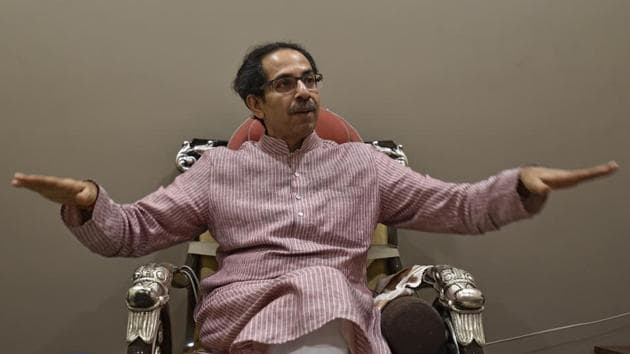
The Shiv Sena sent ripples of surprise through India's political circles on Monday morning when it withdrew its representative, Arvind Sawant, from the Union cabinet. The move capped a fortnight of tense negotiations with its ally, the Bharatiya Janata Party (BJP), and possibly dissolved a three-decade-old coalition.
But experts and political leaders said the seed of the acrimony was sown five years ago, after the Maharashtra assembly election in 2014, when Sena chief Uddhav Thackeray felt outmanoeuvred and humiliated by the BJP, which suddenly catapulted itself to the senior partner and dominant player in the coalition.
"It appears that Thackeray wants the Sena to be big brother again," said political analyst Surendra Jondhale.
When the Sena and the BJP first came together in 1989, the Sena was clearly the bigger partner in the state. The regional outfit, formed in 1966, had built on a nativist plank of "Maratha pride" and burnished its credentials with hard line Hindutva campaigns. In Bal Thackeray, it had a charismatic, popular leader with statewide appeal, something the BJP lacked. Moreover, the party controlled the powerful Brihanmumbai Municipal Corporation, Asia's richest municipal body, and it was said that a roar from its founder was enough to bring Mumbai to a halt. Even when the first Sena-BJP government was sworn in 1995, the Sena was the senior partner.
That abruptly changed in the 2014 assembly election. Riding on the popularity of Prime Minister Narendra Modi, the BJP won 122 seats in the 288-member assembly, within striking distance of the majority mark of 145. The Sena was far behind at 63.
The two parties had fought the elections separately, and so, the relatively poor performance of the Sena stung even more. The Sena first sat in the Opposition, and even when it joined the government, Thackeray's party had to settle without any of the major portfolios of home, finance, revenue, irrigation, cooperation and public works. The party had just 13 ministerial berths.
Therefore, when the results came out this year and the BJP was found to have performed worse than 2014, the Sena chief found the perfect opportunity to assert his authority. After five years of being a subordinate player, suddenly, the BJP, stuck at 105 seats, was dependent on the Sena's 56 legislators to cross the halfway mark. "The Sena leadership is probably of the opinion that the BJP is losing ground and this is the time to assert itself. Thackeray is not just keen to get back the space he lost in 2014 but also ensure the prospects of his son, Aaditya," said Jondhale.
A senior BJP leader said that they expected some bargaining from the Sena but no impasse. "We had not expected such a stalemate," the leader said, adding that the party had not taken into account how unhappy the Sena chief was.